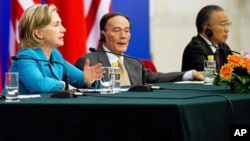Two days of wide-ranging economic and political talks between the United States and China have wrapped up in Beijing. No major agreements were announced, but both sides said they had candid discussions and reaffirmed their commitment to building a strong and enduring relationship.
U.S. Secretary of State Hillary Clinton said the U.S.-Chinese relationship recently hit a rough patch over disagreements on Tibet, Taiwan and China's currency. But the two superpowers overcame their differences because their leaders have opened communication through these political and economic talks.
"Earlier this year, our relationship faced uncertainties, and many questioned the direction we were heading. Now, in an earlier era, we might have experienced a lasting set-back," said Clinton. "But this dialogue mechanism and the habits of cooperation it has helped create, along with the confidence it has built help put us rapidly back on a positive track."
Chinese State Councilor Dai Bingguo also mentioned those differences and said it is impossible for the two countries to agree on everything, but there is a determination to have a strong relationship. He is heard here through a translator:
"We believe that the China-U.S. relationship is critical to both countries and the whole world, said Dai Bingguo. "The two sides also believe that to cultivate and deepen China-U.S. strategic mutual trust is important to the advancement of a China-U.S. relationship in the new century," he said.
U.S. Treasury Secretary Timothy Geithner led the economic track during the Beijing talks. He said differences remain, but the U.S. and China made progress in helping create a more level playing field for American companies operating in and exporting to China.
"China has affirmed its commitment to abide by the principles of non-discrimination; market competition; open trade; intellectual property rights protection; and leaving the terms of technology transfer and production processes to agreements between enterprises," said Geithner.
The two sides also signed several cooperation agreements focusing on customs and border protection, energy resources, nuclear safety, environment and health.
Secretary Clinton stressed that "people-to-people" relationships are just as important as government-to-government ones. At a side event at the National Center for the Performing Arts - which is also known as "the Egg" because of its oval shape - Clinton and State Councilor Liu Yan Dong announced expanded student exchange programs for both countries.
The United States plans to send 100,000 students to China during the next four years to study Mandarin and learn the culture, while China plans to send 10,000 graduate students to America.
Clinton also sat down for a 40-minute television interview with state broadcaster China Central Television, where a studio audience asked her questions ranging from bilateral trade restrictions and the international financial crisis to her daughter Chelsea's upcoming wedding.
From Beijing, Secretary Clinton travels to Seoul for meetings with President Lee Myung-bak to discuss an international response to a North Korean torpedo attack that sank a South Korean warship in March.
US-China Talks Wrap Up in Beijing











